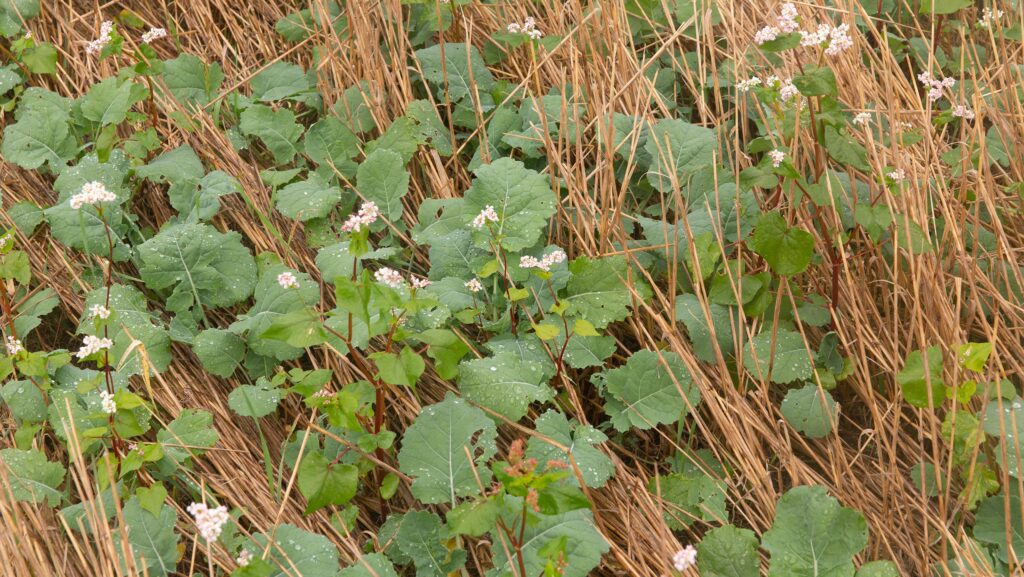Water companies offer premiums to Wildfarmed wheat growers
 Oilseed rape planted alongside a companion crop of buckwheat and berseem clover © Tim Scrivener
Oilseed rape planted alongside a companion crop of buckwheat and berseem clover © Tim Scrivener Four water companies in England are to pay regenerative wheat growers up to £200/ha, in some cases more, if they don’t use pesticides and adopt practices shown to reduce soil run-off into watercourses.
The deal, with Affinity Water, South Staffs and Cambridge Water, Wessex Water and Southern Water, has been secured by regenerative food and farming business Wildfarmed for its farmer suppliers who grow wheat in line with its audited regenerative standards.
See also: How regen farmers can benefit from premium
The payments, which range from £75/ha to more than £200 in “priority” areas, are for farmers who don’t apply pesticides to their growing crop, use companion cropping, and integrate livestock to farm in a nature-friendly way, among other measures.
The funding is on top of premiums paid to growers by Wildfarmed for following its audited standards.
It is currently being piloted for winter and spring wheat crops harvested in 2025, with growers asked to apply directly to the water companies for the payments.
Agricultural run-off and pollution from pesticides are thought to affect around 40% of rivers in England.
Wildfarmed founder Andy Cato described the water premiums as an “important step” towards a food system that values “not only yield, but the ecosystems on which we depend”.
“Farming, which combines food production and nature recovery, offers a massive opportunity to address issues of existential importance: biodiversity, water and health,” he said.
“I have yet to meet a farmer who wouldn’t want to grow food in nature-rich landscapes if they could be fairly rewarded for doing so.”
Water companies
For the water companies, there is financial gain from this agreement too.
According to Affinity Water, regenerative agriculture can potentially deliver a six-to-one return on investment – for every £1 invested in regenerative agriculture there is a £6 return for an ecosystem service such as water quality.
Its catchment manager Danny Coffey said this is because soils farmed in a regenerative way can hold and prevent harmful contaminants getting into water abstracted for the public water supply.
Wildfarmed’s standards go a step further, Mr Coffey added, which means Affinity Water doesn’t have to solely relay on “end of pipe” treatment that is energy- and carbon-intensive.
“We hope that paying for this ecosystem service using the water premium will ensure that regenerative farming remains profitable, farmers can continue to invest in their soils for the benefit of both crop and water production, and we all work towards creating more resilient water catchments to the impacts of climate change,” he said.
Recruiting
Wildfarmed, which works with more than 100 growers across the UK, is currently recruiting new suppliers ahead of the 2025 harvest.
It is seeking to work with more water companies nationwide to develop similar partnerships and support farmers.
Funding commitments from four water companies
- South Staffs and Cambridge Water is offering £200/ha for priority areas
- Affinity Water, which covers London, Eastern and South East England, will pay £75/ha in addition to other payments for regenerative practices
- Wessex Water is offering £200/ha and higher in priority areas
- Southern Water, operating in East and West Sussex, Kent, Hampshire and the Isle of Wight, will pay £175/ha in priority areas
